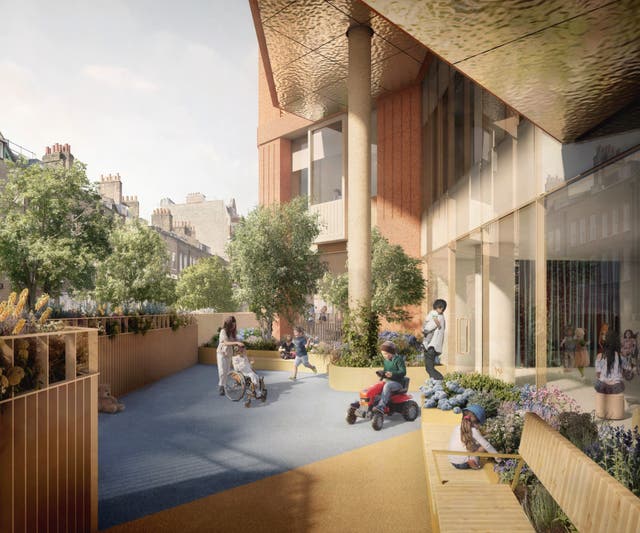Four-year-old girl happy to start school after recovering from cancer treatment
Yumna Abdul, from Bethnal Green, east London, had just turned two when she was diagnosed with stage four high-risk neuroblastoma in December 2021.

A four-year-old girl declared cancer-free after treatment for neuroblastoma was delighted to join other children for her first day at primary school.
Yumna Abdul had just turned two when she was diagnosed with stage four high-risk neuroblastoma – a rare cancer that develops in early nerve cells – in December 2021.
Since then, cancer treatment and repeated infections have meant she has missed out on a lot of the social opportunities that most young children enjoy.

It was an emotional farewell for Salma, 43, who said there were times when she thought her daughter would never be well enough to go to school.
“I wasn’t looking forward too much as I didn’t know what tomorrow would bring. It was a bit scary,” she told the PA news agency.

“It’s emotional but amazing at the same time.”
She added: “I actually cried all the way home. I have got three other kids and I have never cried like that before.”
Salma said her daughter had been like an extension of herself – “joined at the hip” – due to her treatment so it was a big change to not have her around on Tuesday.

“She said she had a good day and seems to be happy! Something Yumna always says is ‘It’s OK, everything will be fine because I’m Yumna’.”
Salma said she did not take Yumna out of the house at all when she was first diagnosed: “I was too scared.”
Yumna’s brothers Yaaseen, 18, and Tahseen, 16, and sister Tayibah, 12, are older so she has had little chance to interact with children her own age.

Yumna’s illness, coming after the sudden death of Salma’s mother in 2020, took a toll on the whole family.
“My kids found it very difficult to deal with. Both parents were giving all their time to their younger sister,” Salma said.
Yumna immediately started intensive chemotherapy treatment before having surgery to remove the tumour in 2022.
Immunotherapy, which targeted any remaining cancer cells, began in October 2022 and, while Yumna was declared cancer-free in June 2023, she continued to have underlying infections.
The family calls September 4 Yumna’s “Freedom Day” because that is the date last year when she was found to be clear of all infections.
Her mother said the treatment “took a huge toll” and “made her very, very weak”.
“It has taken a while to build herself back up again,” she added.

“She is able to play and jump, the simple things that kids are supposed to do,” Salma said.
“There’s still things that she can’t do but we’ll eventually get there.”
Yumna has been able to enjoy family trips to Bangladesh, Saudi Arabia and Portugal and she also hopes to visit Dubai.

Salma said the hospital’s doctors, nurses, cleaners and porters were “so amazing”, adding: “I can’t thank everyone enough.”
“We call it our second home. People there are our family as well.
“We wouldn’t be here if they weren’t there for us.”

The centre will support seriously-ill children from diagnosis to remission, providing digitally advanced inpatient wards, cutting-edge imaging technology and state-of-the-art treatment facilities.
Alongside new clinical facilities, there will also be a new hospital school which will allow seriously-ill children and young people the chance to continue their education.
Gosh Charity director of fundraising Liz Tait said: “On behalf of everyone at Gosh Charity, I want to say a huge good luck to Yumna as she embarks on this new adventure. It’s wonderful to see her doing so well and how much she has achieved so far.
“School is a key part of childhood and helps shape us all. That’s why Gosh Charity wants to make sure as many children as possible have the chance to continue their education in hospital.
“The vital funds raised for the new children’s cancer centre will help us to ensure seriously-ill children get the education they deserve, with a state-of-the-art school which will provide a crucial sense of stability during one of the toughest periods of their lives.”
Every day, five families in the UK receive the devastating news that their child has cancer and, while investment in research and treatment has significantly improved survival rates, cancer remains the most common cause of death in children aged one to 14, with some forms of cancer only having a 2% survival rate.





